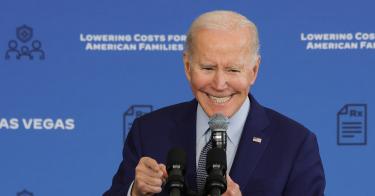The president’s budget for fiscal year 2024 is less a display of prudent finance as it is reminiscent of a carnival shell game. If you don’t pay close attention to the details, you’ll wind up suckered by the man moving the ball around. President Joe Biden’s political talking points may appease his Democrat colleagues, but the details should alarm Americans who stand to lose in this $7-trillion shell game on the national stage.
The first attempt at distraction in this game is the assumption that the Treasury needs more tax revenue to reduce the deficit. At first glance, that checks out mathematically—but it ignores the larger reality.
Fundamentally, the nation does not have a revenue problem; it has a spending problem. Tax revenue has never been higher, whether measured in nominal terms, or adjusted for inflation, or as a percent of GDP, or as a percent of income. Rather, it is government spending which has ballooned to unsustainable levels and created record-breaking deficits.
Consider that federal expenditures were about $4.8 trillion in 2019 but were over $6 trillion in 2022. That’s a 25%-increase in three years—far outpacing economic growth—and it doesn’t even include the $6.7 trillion spent during the pandemic in 2020 or the record-breaking $7.2 trillion spent in 2021, Biden’s first year in office.
>>> 6 Charts Show Crucial Facts About Spending, Taxes, Deficits Missing From Biden’s Budget
The logical choice would be to cut spending, but the White House has opted for more taxes instead. However, many of the proposed tax increases won’t even be paid by those allegedly being taxed. The corporate tax increase is a prime example of another act of deception in this shell game.
Corporations do not pay taxes; only people can pay taxes. The corporate income tax is paid by employees in the form of lower wages, by customers in the form of higher prices, and by savers in the form of lower returns on their investments.
The White House touts this as "making corporations pay their fair share," but that is a sound bite which isn’t very sound. The middle-class employee at a corporation, who is also a customer at corporations, and who has a 401(k) invested in corporations, is unknowingly paying the very taxes which Biden alleged would fall on "big business."
Likewise, tax increases on coal, oil and natural gas will simply be passed onto consumers, both in the form of higher utility bills but also higher prices just about everywhere. When businesses are paying more for their own utilities and for transportation, they end up raising the prices they charge for their own goods and services.
A similar illusion is at work in the White House’s proposal to effectively double the tax on capital gains. Inflation has driven up the price of many investments, but there has not been a commensurate increase in the real value of those assets. Nevertheless, capital gains tax is due on these inflated price increases, at twice the current rate.
On top of inflation already being a tax, the White House wants to increase that burden on savers even further in this budget, so that inflation gets you coming and going. That doesn’t sound like "paying your fair share," as the president says.
All told, the proposed budget adds $5.5 trillion in additional taxes over the next decade. And where is all this tax revenue going?
>>> From Concerning to Terrifying: 7 Horrible Milestones on Horizon for Bloated Federal Budget
Instead of addressing the structural problems in Medicare, Obamacare, Social Security and the Highway Trust Fund, this budget kicks the can down the road, merely putting off the day of reckoning a little longer by throwing more money at the problem. Ironically, research shows that this budget’s higher taxes will undermine the very economic growth that is necessary to keep these government programs adequately funded.
On top of inflation already being a tax, the White House wants to increase that burden on savers even further in this budget, so that inflation gets you coming and going. That doesn’t sound like "paying your fair share," as the president says.
All told, the proposed budget adds $5.5 trillion in additional taxes over the next decade. And where is all this tax revenue going?
Instead of addressing the structural problems in Medicare, Obamacare, Social Security and the Highway Trust Fund, this budget kicks the can down the road, merely putting off the day of reckoning a little longer by throwing more money at the problem. Ironically, research shows that this budget’s higher taxes will undermine the very economic growth that is necessary to keep these government programs adequately funded.
This piece originally appeared in Fox News




